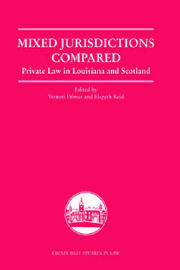Book contents
- Frontmatter
- Contents
- Preface
- List of Contributors
- List of Abbreviations
- Table of Cases
- 1 Praedial Servitudes
- 2 Title Conditions in Restraint of Trade
- 3 Servitudes: Extinction by Non-Use
- 4 Inheritance and the Surviving Spouse
- 5 Ownership of Trust Property in Scotland and Louisiana
- 6 The Legal Regulation of Adult Domestic Relationships
- 7 Impediments to Marriage in Scotland and Louisiana: An Historical-Comparative Investigation
- 8 Contracts of Intellectual Gratification – A Louisiana-Scotland Creation
- 9 The Effect of Unexpected Circumstances on Contracts in Scots and Louisiana Law
- 10 Hunting Promissory Estoppel
- 11 Unjustified Enrichment, Subsidiarity and Contract
- 12 Causation as an Element of Delict/Tort in Scots and Louisiana Law
- 13 Personality Rights: A Study in Difference
- Index
6 - The Legal Regulation of Adult Domestic Relationships
Published online by Cambridge University Press: 12 September 2012
- Frontmatter
- Contents
- Preface
- List of Contributors
- List of Abbreviations
- Table of Cases
- 1 Praedial Servitudes
- 2 Title Conditions in Restraint of Trade
- 3 Servitudes: Extinction by Non-Use
- 4 Inheritance and the Surviving Spouse
- 5 Ownership of Trust Property in Scotland and Louisiana
- 6 The Legal Regulation of Adult Domestic Relationships
- 7 Impediments to Marriage in Scotland and Louisiana: An Historical-Comparative Investigation
- 8 Contracts of Intellectual Gratification – A Louisiana-Scotland Creation
- 9 The Effect of Unexpected Circumstances on Contracts in Scots and Louisiana Law
- 10 Hunting Promissory Estoppel
- 11 Unjustified Enrichment, Subsidiarity and Contract
- 12 Causation as an Element of Delict/Tort in Scots and Louisiana Law
- 13 Personality Rights: A Study in Difference
- Index
Summary
INTRODUCTION
Family law, perhaps more than any other area of law, reflects the society it serves. This is not surprising since, after all, society at heart is made up of families, of groupings of individuals bound by ties of blood and affection who share their private lives together and who present to the public as “belonging” to each other. As society and family forms change, so too does family law change: the profound historical shifts in social structures between the beginning and the end of the twentieth century in both the jurisdictions under consideration in this book find their reflection in equally profound legal changes. So, for example, the changes to the position of women in society led inexorably to a fundamental restructuring of the husband-wife relationship in both Scotland and Louisiana with various practical legal consequences; the development of a previously unimagined diversity of methods by which children can be – and are – brought into existence today has forced both jurisdictions to alter ages-old perceptions of parenthood; the secularisation of marriage and the virtual evaporation of the unquestioned acceptance that marriage, good or bad, must be enjoyed or endured for life, has not only increased the number of divorces in fact but has also led to the liberalisation of the grounds for divorce in law. The process continues. As “gay liberation” from the 1970s transformed itself into “gay pride” in the 1990s, most societies across the western world rejected their previous abhorrence of same-sex relationships and moved to a state of tolerance, acceptance and (in some places) celebration of sexual diversity.
- Type
- Chapter
- Information
- Mixed Jurisdictions ComparedPrivate Law in Louisiana and Scotland, pp. 146 - 172Publisher: Edinburgh University PressPrint publication year: 2009



